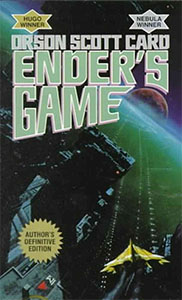 Here’s a question I’ve seen come up quite a few times: Is the Ender’s Game series by Orson Scott Card worth reading? And, if so, should you bother with sequels?
Here’s a question I’ve seen come up quite a few times: Is the Ender’s Game series by Orson Scott Card worth reading? And, if so, should you bother with sequels?
As a young adult, Ender’s Game was one of those books that stuck with you and transformed you and informed everything you read from that point forward in your life. Revisiting the book a few years ago as an adult, it was not quite so utterly mind-blowing, but it was still a really good piece of science fiction and I recommend it highly.
Speaker for the Dead, on the other hand, is one of the best science fiction novels ever written.
So, basically, yes. I enthusiastically recommend these books and I think your life is poorer if you haven’t read them.
With that being said, here’s my recommendation for tackling the Ender-verse:
(1) Start with Ender’s Game and read through the original sequence of novels until you don’t like them any more. Then stop. They aren’t going to get any better.
Ender’s Game
Speaker for the Dead
Xenocide
Children of the Mind
(2) Now, pop over to Ender’s Shadow. Read through this second sequence of novels until you don’t like them any more. Then stop. They are going to get a lot worse very, very quickly.
Ender’s Shadow
Shadow of the Hegemon
Shadow Puppets
First Meetings
Shadow of the Giant
Shadows in Flight
I stopped reading about midway through that sequence, so I don’t have any opinion on the Ender inter-quels:
A War of Gifts: An Ender Story
Ender in Exile
Nor do I have any opinion about the prequel trilogy:
Earth Unaware
Earth Afire
Earth Awakens
But I suspect I’m not missing anything.











